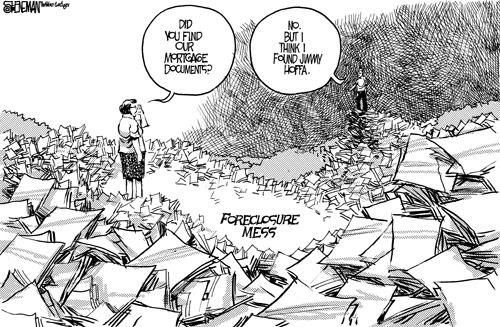Human Rights First, a non-profit, nonpartisan international human rights organization, has issued it report card for President Obama on issues of human rights and the rule of law. The report overall is not encouraging for a President who as a candidate purported to restore the rule of law. His overall grade is “D”.
The President did garner two “A-“‘s with caveats. While he has denounced torture, detainee abuse and secret detention sites, there are still major concerns about “various interrogation techniques that are permitted by Appendix M of the Army Field Manual that are inconsistent with the Geneva Conventions requirement of humane treatment” and “the Joint Special Operations Command detention facility in Parwan, Afghanistan operates outside the authority of the Joint Task Force established to oversee detention.” “B” and “C-” are given for transferring GTMO detainees cleared for release and trying terror suspects in Federal courts, respectively. He gets a “C” for establishing accountability and oversight of U.S. private security and other contractors but didn’t go far enough holding “private security contractors in zones of armed conflict and elsewhere accountable for violations of international and domestic law, including incidents involving allegations of torture.” The rest of the report is damning.
The President gets a failing grade for not closing Guantanamo although he promised to do that two years ago. Even though the President has publically argued for closure of Guantanamo, he has failed to do so.
The continued use of military commissions to prosecute detainees gets an “F”. The commissions constitute a war crime under international law for a number of reasons:
. . . (the commissions) prosecute as war crimes conduct that was not a violation of the laws of war at the time the conduct occurred. They fail to ensure exclusion of evidence gained through torture or other abuse. They do not ensure that an accused or defense counsel will be able to see all relevant inculpatory and exculpatory evidence. Permissive hearsay rules fail to ensure that an accused or defense counsel will be able to confront witnesses. New rules governing procedure were introduced in the spring. While the rules are an improvement over the past iterations, they do not cure the fundamental flaws of the commissions. The only way to ensure that detainee trials comport with applicable law is to end military commissions and transfer prosecutions to federal criminal court.
An “F” is given for not holding accountable those who authorized and perpetrated torture against prisoners in U.S. custody:
In November 2010, the Justice Department announced that there would be no prosecutions for destruction of CIA tapes that allegedly recorded acts of torture committed by employees or agents of the United States. Special Prosecutor John Durham has yet to release his report on the investigation into whether crimes were committed by U.S. officials during any interrogations that included “enhanced interrogation techniques,” such as waterboarding, a well-known form of torture. The failure to hold accountable those responsible for acts of torture and to provide redress to victims (see “State Secrets” below) is a violation of international law and diminishes the credibility of the United States as standard-bearer for human rights worldwide.
The abuse of states secrets privilege also gains an “F”:
The Obama Administration has repeatedly asserted the “state secrets privilege” to obtain dismissal of legal claims by victims of U.S.-sponsored torture. Although federal courts have procedures they can use to protect the disclosure of classified information, the Administration has instead successfully convinced courts to dismiss these cases in their entirety on state secrets grounds. This has made it impossible for victims of U.S.-sponsored torture to obtain any form of accountability and redress.
“D”‘s are given for:
Not ending indefinite detention:
It was reported on December 22, 2010 that the Obama Administration plans to issue an Executive Order that would provide for legal representation and a review process for the 48 Guantanamo detainees who have been designated to be held indefinitely without trial.
Not articulating a rule of law for targeted killings:
The Obama administration over the past year dramatically stepped up its secret program of targeted killings, particularly along the Afghanistan-Pakistan border, but has failed to adequately articulate the legal basis for the program and how its choices of targets meet the requirements of international law.
The continued use of extraordinary rendition and lack of diplomatics assurances:
The Obama Administration continues to assert the right to transfer detainees to other countries without the protections of legal process based on diplomatic assurances from the receiving country that the detainee will not be abused, even where that country is known to abuse and torture detainees.
The report gives the President an “Incomplete” on establishing due process in Afghanistan and the remainder of the report enumerates eight things the President can do in the future to improve his “grades”. I wouldn’t hold my breath.

 On this day in 1761, the
On this day in 1761, the  The Third Battle of Panipat saw an enormous number of casualties and deaths in a single day of battle. It was the last major battle between indigenous South Asian military powers, until the creation of
The Third Battle of Panipat saw an enormous number of casualties and deaths in a single day of battle. It was the last major battle between indigenous South Asian military powers, until the creation of  On January 7, the Too-Big-To-Fail Banks got some really dreadful news in the form of a
On January 7, the Too-Big-To-Fail Banks got some really dreadful news in the form of a
Recent Comments